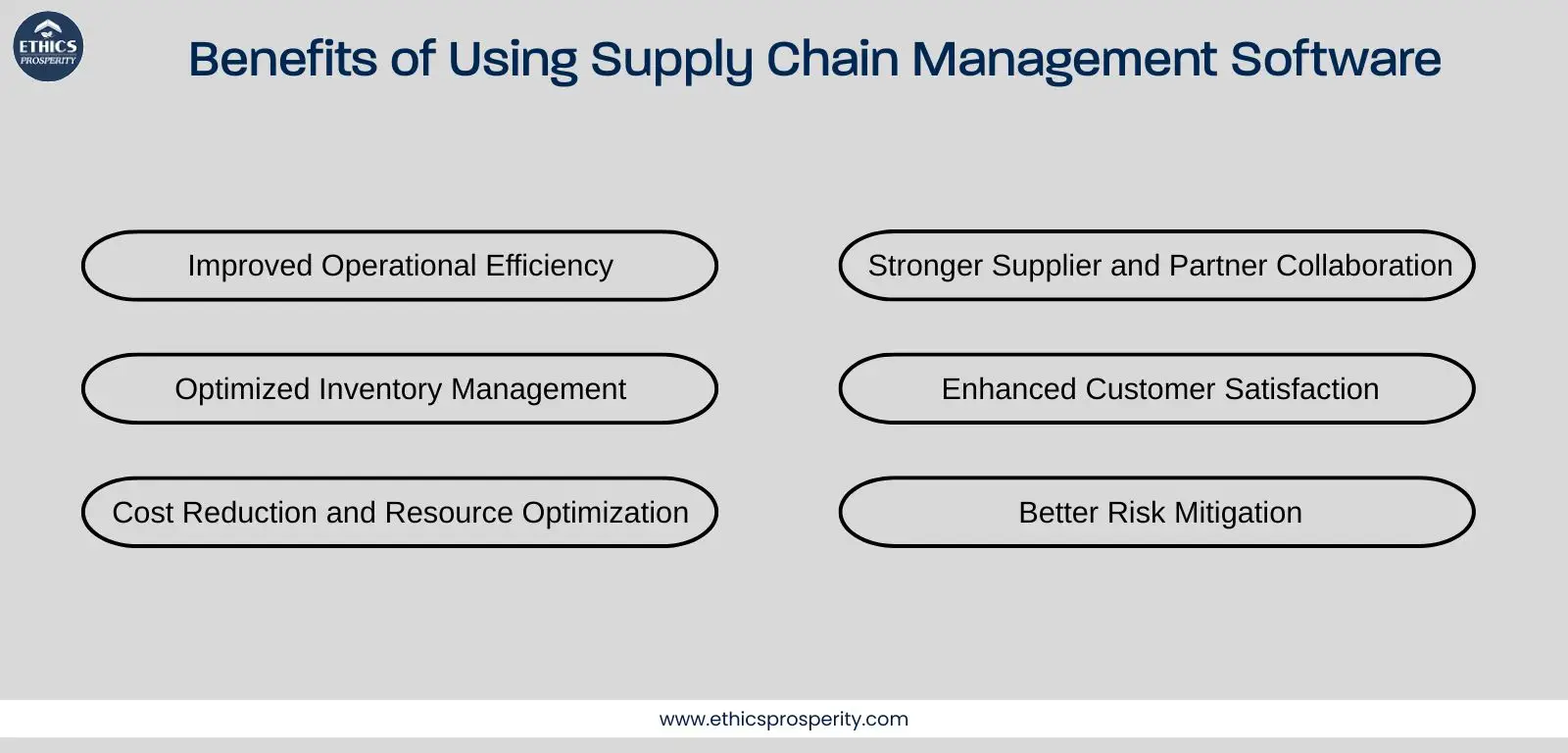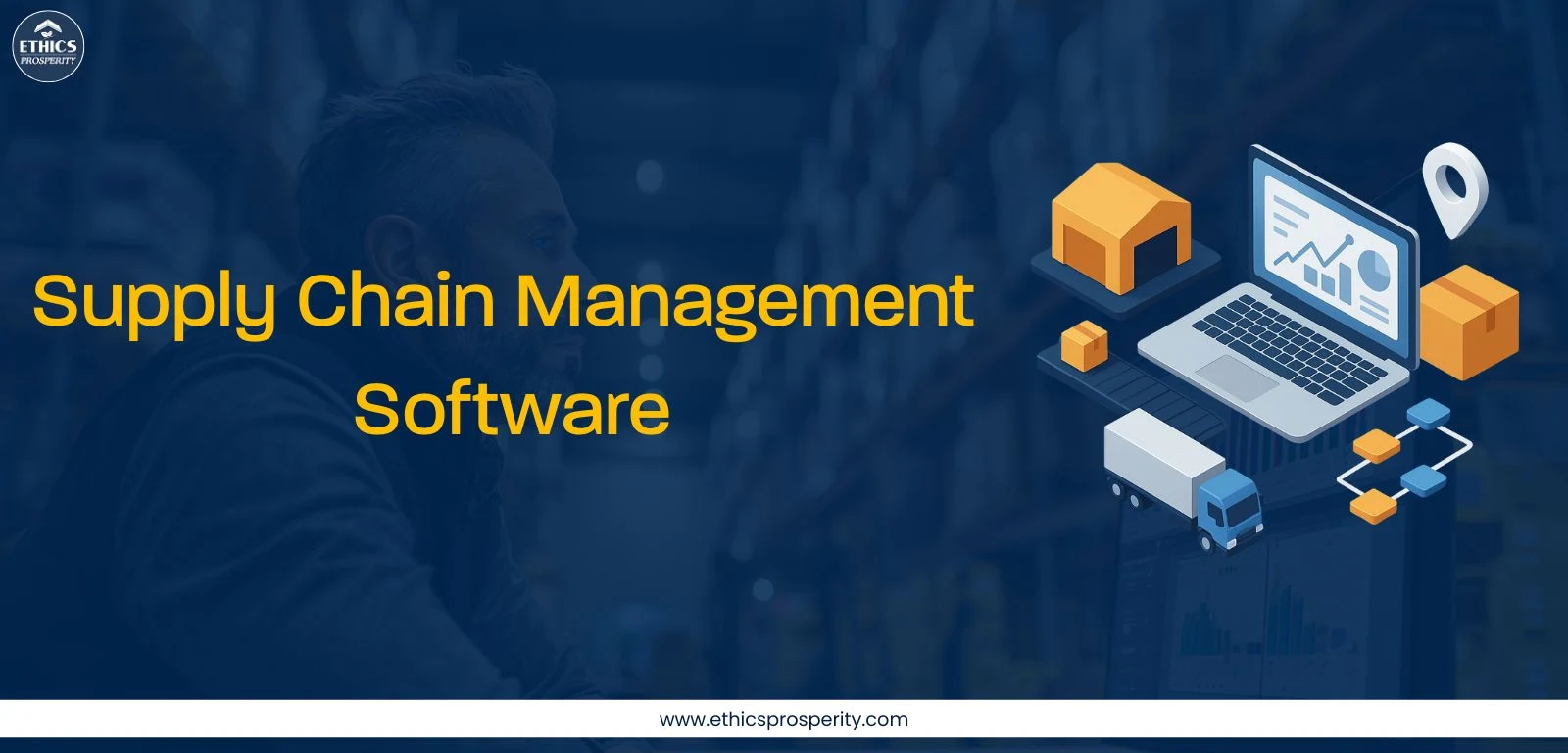By 2025, global supply chains have become increasingly complex, data-centric, and highly interconnected. Supply Chain Management (SCM) software enables organizations to plan, execute, and oversee every stage of the supply chain from sourcing and production to inventory control and distribution. Thus, improving visibility, cutting costs, enhancing forecasting, and maintaining continuity during disruptions. Selecting the right SCM solution depends on an organization’s size, industry, and specific needs, with crucial factors including real-time analytics, ERP integration, AI-driven forecasting, and the ability to scale for global operations; across manufacturing, retail, and logistics, these platforms are essential for boosting efficiency and supporting better decision-making.
How Supply Chain Management Software Works
Supply Chain Management (SCM) software functions as an integrated digital platform that connects, coordinates, and optimizes all activities involved in the movement of goods from sourcing raw materials to delivering finished products. It collects data from various departments, partners, and logistics systems, then uses analytics, automation, and real-time monitoring to support smarter, faster decision-making.
Operational Framework of SCM Platforms are as follow:
1. Centralized Data Integration: SCM software consolidates information from procurement, production, inventory, warehouses, transportation, and suppliers into a single, unified system. This eliminates data silos and ensures that all stakeholders access consistent, real-time information.
2. Real-Time Visibility and Tracking: It monitors the movement of goods, inventory levels, and order statuses in real time using sensors, barcodes, RFID, and IoT integrations, enabling proactive decision-making.
3. Planning and Forecasting: Advanced analytics and AI-powered algorithms help forecast demand, plan inventory levels, schedule production, and allocate resources efficiently.
4. Inventory and Warehouse Optimization: SCM systems help maintain optimal stock levels, track stock locations, and streamline warehouse operations through automated picking, packing, and storage processes.
5. Transportation and Logistics Management: They optimize routes, assign carriers, schedule shipments, and track deliveries to minimize costs and ensure timely distribution.
6. Collaboration and Communication: The software facilitates seamless communication among suppliers, manufacturers, distributors, and retailers, improving coordination and reducing delays.
7. Reporting and Performance Analytics: SCM systems generate dashboards and analytical reports that support strategic decision-making, efficiency assessments, and continuous improvement initiatives.
Benefits of Using Supply Chain Management Software

Supply Chain Management (SCM) software delivers a wide range of advantages that streamline operational processes, lower expenses, and elevate overall organizational performance by enabling greater visibility, coordination, and control across the entire supply chain network.
Some key benefits are as follow:
1. Improved Operational Efficiency: Automation of routine tasks—such as order processing, scheduling, and documentation—reduces manual errors and speeds up workflows.
2. Optimized Inventory Management: The system ensures optimal inventory levels, reduces carrying costs, and prevents unnecessary waste or storage issues.
3. Cost Reduction and Resource Optimization: By improving planning, reducing delays, and streamlining logistics, SCM software helps lower transportation, labor, and operational costs.
4. Stronger Supplier and Partner Collaboration: Integrated platforms enable seamless communication and data sharing with suppliers, distributors, and logistics partners, improving coordination.
5. Enhanced Customer Satisfaction: Faster deliveries, accurate order tracking, and improved service reliability lead to better customer experiences.
6. Better Risk Mitigation: Predictive alerts and early warnings help identify potential disruptions—such as delays, shortages, or quality issues—before they escalate.
Why Supply Chain Management Software Matters
Supply Chain Management (SCM) software is indispensable, as the supply chain serves as the fundamental core of most enterprises, shaping efficiency, profitability, and customer experience. It converts disconnected, fragmented processes into a cohesive, integrated, and data-driven operational framework.
Why Modern Businesses Rely on SCM Software as follow:
-
Enhances real-time visibility across the entire supply chain.
-
Improves coordination between suppliers, manufacturers, distributors, and customers.
-
Streamlines operations by automating manual and repetitive tasks.
-
Supports faster and smarter decision-making through data analytics and dashboards.
-
Reduces operational costs by optimizing inventory, transportation, and resource usage.
-
Increases supply chain agility to respond quickly to disruptions or market changes.
-
Strengthens customer satisfaction through timely deliveries and accurate order tracking.
-
Improves risk management by identifying potential delays or bottlenecks early.
-
Boosts overall efficiency and competitiveness in a dynamic business environment.
Top Supply Chain Management Software Solutions
In 2025, selecting the appropriate supply chain management software has become a critical strategic choice. Organizations increasingly prioritize systems that integrate advanced AI, support smooth interoperability, and deliver real-time insights to maintain a competitive edge in an unpredictable market environment. There is strong adoption of cloud-based SCM solutions, driven by scalability and lower infrastructure costs. Here are some top supply chain management software solutions:
1. Ethics Prosperity
-
Ethics Prosperity is a supply-chain company offering end-to-end logistics, warehousing, and distribution services across India.
-
It operates on a technology-first supply chain model, combining digital tools with physical infrastructure.
-
Warehouse Management System (WMS): Their WMS supports real-time inventory tracking, automation of warehouse processes, and analytics to improve efficiency.
-
Transport Management System (TMS): Their platform includes route optimization, carrier selection, and live shipment tracking to reduce transportation costs and increase delivery reliability.
-
Order Management System (OMS): They centralize order data across multiple sales channels. Their OMS supports auto-allocation of orders, return management, and real-time tracking.
-
ERP Integration: Their platform integrates with customized ERP systems for seamless data flow, powerful reporting, and scalability. Thus, helps align supply chain operations with enterprise-level financial, sales, and operational systems.
2. Ramco SCM
-
Ramco is a Chennai-based enterprise software company.
-
Their SCM suite covers procurement, inventory, warehouse management, transportation, and analytics, helping companies synchronize supply with demand.
-
The platform supports real-time visibility across the entire network and helps in data-driven decision-making.
-
Built on a cloud-native, multi-tenant architecture that allows flexibility and scalability.
-
Ramco also integrates logistical capabilities specifically for 3PLs (Third-Party Logistics), including transport and fleet management.
3. Locus NodeIQ
-
Locus is a deep-tech SaaS company headquartered in India, specializing in logistics and supply chain automation.
-
Their product NodeIQ is an AI-powered decision-making engine that optimizes strategic supply chain variables like inventory, network design, facility location, and sourcing.
-
It uses a “Digital twin” model, allowing businesses to simulate “what-if” scenarios (e.g., changing demand, new warehouse locations) before executing changes.
-
Locus also has tactical modules like DispatchIQ (dynamic routing), TrackIQ (real-time fleet visibility), and FieldIQ(field operations planning).
4. Shipsy SCM / Logistics Platform
-
Shipsy is an India-based SaaS platform specializing in end-to-end logistics and supply chain visibility.
-
It offers a “predictive control tower” for SKU-level inventory visibility and movement tracking across supply chain nodes.
-
Shipsy supports AI-based route planning, smart 3PL selection, and automated carrier allocation based on cost, performance, COD, and other metrics.
-
The platform features unified communication with customers (e.g., via SMS/WhatsApp/email) about delivery stages, improving delivery experience.
-
Shipsy’s WMS (Warehouse Management System) capabilities use AI for slotting, labor optimization, and real-time exception management to make warehouses dynamically efficient.
5. LogiNext
-
LogiNext provides a modular, cloud-based delivery automation platform that helps companies digitize and optimize logistics operations.
-
Supports a wide range of logistics use-cases: e-commerce delivery, 3PL operations, courier/express parcel management, and field workforce operations.
-
Offers highly configurable modules with flexible APIs, enabling seamless integration with existing systems.
-
Because of its modular design, LogiNext can scale from small logistics operations to very large, complex delivery networks.
-
The platform helps optimize route planning, fleet utilization, and provides delivery ETA management, making logistics more efficient and customer-centric.
How to Choose the Best Supply Chain Management Software
Selecting the right supply chain management software can be challenging amid shifting business requirements and volatile market conditions. Beyond basic functionality, organizations should evaluate a solution’s adaptability, interoperability with existing systems, and its proven ability to deliver measurable improvements across the supply chain. The following section summarises the key criteria to consider when choosing an SCM platform that aligns with your enterprise objectives.
-
Identify your needs – Know what you want to improve: inventory control, forecasting, order management, or logistics.
-
Check essential features – Look for inventory, WMS, TMS, order management, procurement, and analytics.
-
Ensure smooth integration – It should easily connect with your ERP, CRM, e-commerce systems, and warehouse devices.
-
Look for modern technology – AI, IoT, automation, and real-time dashboards are must-haves in 2025.
-
Focus on scalability – Pick software that can grow with your business across locations and SKUs.
-
Choose user-friendly tools – Simple UI, mobile access, and fast onboarding improve adoption.
-
Verify security – Ensure strong data protection and compliance with industry regulations.
-
Assess vendor reliability – Look for experienced vendors with strong customer support.
-
Request a demo or pilot – Test the software with your real processes before finalizing.
Conclusion
In today’s rapidly evolving business landscape, modern SCM software has become essential for improving visibility, efficiency, and decision-making across the entire supply chain. As organizations adopt advanced technologies such as AI, IoT, automation, and real-time analytics, choosing the right platform is key to achieving agility and long-term competitiveness. Solutions like Ethics Prosperity, with their technology-first approach and integrated WMS, TMS, OMS, and ERP capabilities, demonstrate how innovative SCM platforms can transform operations and create smarter, more resilient supply chains. Businesses that adopt the right SCM software are better positioned to navigate market volatility, optimize performance, and drive sustainable growth.
